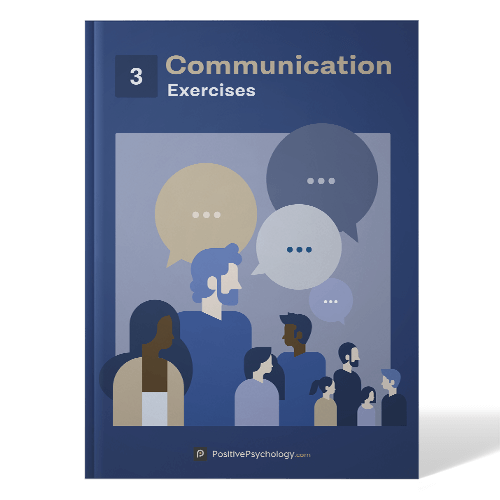

Positive outcomes from therapy and counseling rely on the strength of the relationship between the mental health professional and the client.
Such connections build on effective communication: what we express and how we express it (Wachtel, 2011).
Establishing empathy with clients requires a high degree of insight and a strong sense of shared understanding (Norcross, 2011).
Thankfully, communication is a skill that can be monitored and improved through awareness, education, and practice.
This article explores the importance of communication in therapy and counseling, introducing several vital skills and techniques and providing a set of worksheets to improve communication both inside and outside sessions.
Before you continue, we thought you might like to download our three Positive Communication Exercises (PDF) for free. These science-based tools will help you and those you work with build better social skills and better connect with others.
A task force set up by the American Psychological Association reviewed research on what makes therapeutic relationships most successful. Based on 16 meta-analyses, they found the following to be vital (Angelis, 2019):
With the therapeutic relationship as essential as the treatment method, communication and collaboration become increasingly valuable to the overall outcomes of therapy and counseling (Angelis, 2019).
Wachtel (2011, p. ix) highlights the importance of communication in the therapeutic technique and the need to “move from understanding the patient or client to putting that understanding into words.”
Communication may differ depending on the situation and the approach, yet it remains central to both talking cures and behavioral interventions. As a result, both seasoned professionals and those new to counseling or therapy will benefit from focusing on what they say and how they say it (Wachtel, 2011).
Framing effective therapeutic comments and achieving a fuller understanding of what is being said are skills that rely on awareness, good technique, and practice.
Communication can be subtle and multi-layered; an overt message often conveys a secondary meta-message. While we may not be conscious of the latter, it has considerable potential to affect therapeutic transformation – and failure. With that in mind, mental health professionals must care about what they and the client say and how they say it (Wachtel, 2011).

The words and phrases we choose with clients in therapy express feelings we want to convey and therefore matter greatly.
They have the power to significantly impact the therapeutic alliance and outcome (Wachtel, 2011).
Our communications are more than simple interventions; they shape “the climate of the relationship and the tenor of the alliance” (Wachtel, 2011, p. 3). Even subtle changes in communication style and content can alter the client’s experience of the relationship, their progress, how they see themselves, and their potential for change.
In addition to paying close attention to and comprehending their client, it is therefore vital that therapists consider what they say based on the understanding received. Therapists must use good communication skills to effectively and empathically put their observations into words, enabling the client to integrate new knowledge into an expanded sense of self without feeling shame (Wachtel, 2011).

These detailed, science-based exercises will equip you or your clients with tools to improve communication skills and enjoy more positive social interactions with others.